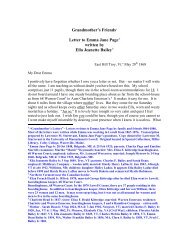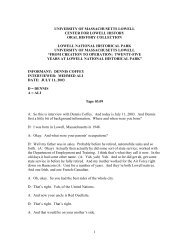LOOM AND SPINDLE OR Life Among the Early Mill Girls WITH A ...
LOOM AND SPINDLE OR Life Among the Early Mill Girls WITH A ...
LOOM AND SPINDLE OR Life Among the Early Mill Girls WITH A ...
You also want an ePaper? Increase the reach of your titles
YUMPU automatically turns print PDFs into web optimized ePapers that Google loves.
CHAPTER IV.<br />
THE CHARACTERISTICS OF THE EARLY FACT<strong>OR</strong>Y GIRLS.<br />
When I look back into <strong>the</strong> factory life of fifty or sixty years ago, I do not see what is<br />
called "a class" of young men and women going to and from <strong>the</strong>ir daily work, like so<br />
many ants that cannot be distinguished one from ano<strong>the</strong>r; I see <strong>the</strong>m as individuals, with<br />
personalities of <strong>the</strong>ir own. This one has about her <strong>the</strong> atmosphere of her early home. That<br />
one is impelled by a strong and noble purpose. The o<strong>the</strong>r, –what she is, has been an<br />
influence for good to me and to all womankind.<br />
Yet <strong>the</strong>y were a class of factory operatives, and were spoken of (as <strong>the</strong> same class is<br />
spoken of now) as a set of persons who earned <strong>the</strong>ir daily bread, whose condition was<br />
fixed, and who must continue to spin and to weave to <strong>the</strong> end of <strong>the</strong>ir natural existence.<br />
Nothing but this was expected of <strong>the</strong>m, and <strong>the</strong>y were not supposed to be capable of<br />
social or mental improvement.<br />
That <strong>the</strong>y could be educated and developed into something more than mere work-people,<br />
was an idea that had not yet entered <strong>the</strong> public mind. So little does one class of persons<br />
really know about <strong>the</strong> thoughts and aspirations of ano<strong>the</strong>r! It was <strong>the</strong> good fortune of<br />
<strong>the</strong>se early mill-girls to teach <strong>the</strong> people of that time that this sort of labor is not<br />
degrading; that <strong>the</strong> operative is not only "capable of virtue," but also capable of selfcultivation.<br />
At <strong>the</strong> time <strong>the</strong> Lowell cotton-mills were started, <strong>the</strong> factory girl was <strong>the</strong> 1owest among<br />
women. In England, and in France particularly, great injustice had been done to her real<br />
character; she was represented as subjected to influences that could not fail to destroy her<br />
purity and self-respect. In <strong>the</strong> eyes of her overseer she was but a brute, a slave, to be<br />
beaten, pinched, and pushed about. It was to overcome this prejudice that such high<br />
wages had been offered to women that <strong>the</strong>y might be induced to become mill-girls, in<br />
spite of <strong>the</strong> opprobrium that still clung to this "degrading occupation." At first only a few<br />
came; for, though tempted by <strong>the</strong> high wages to be regularly paid in "cash," <strong>the</strong>re were<br />
many who still preferred to go on working at some more genteel employment at seventyfive<br />
cents a week and <strong>the</strong>ir board.<br />
But in a short time <strong>the</strong> prejudice against factory labor wore away, and <strong>the</strong> Lowell mills<br />
became filled with blooming and energetic New England women. They were naturally<br />
intelligent, had mo<strong>the</strong>r-wit, and fell easily into <strong>the</strong> ways of <strong>the</strong>ir new life. They soon<br />
began to associate with those who formed <strong>the</strong> community in which <strong>the</strong>y had come to live,<br />
and were invited to <strong>the</strong>ir houses. They went to <strong>the</strong> same church, and sometimes married<br />
into some of <strong>the</strong> best fami1ies. Or if <strong>the</strong>y returned to <strong>the</strong>ir secluded homes again, instead<br />
of being looked down upon as "factory girls" by <strong>the</strong> squire's or <strong>the</strong> lawyer's family, <strong>the</strong>y<br />
were more often welcomed as coming from <strong>the</strong> metropolis, bringing new fashions, new<br />
books, and new ideas with <strong>the</strong>m.











